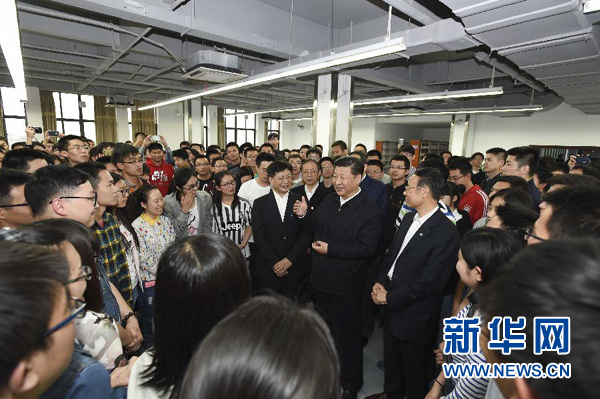Editor’s Note: This article is from WeChat WeChat official account’s "FBIF Food and Beverage Innovation" (ID:FoodInnovation), by FBIF, published by 36Kr with authorization.
Author: lamb
Editor: Momo
There is a classic line in "The Best Life of a Spoiled Woman": How can you eat Bunny, Bunny is so cute?
Qi Wei, a rabbit eater, once described the rabbit head to Xiao S in a variety show: delicious and fried. She describes how to eat the rabbit’s head while doing actions-first of all, you have to break the rabbit’s chin completely from this position. Amway has invited many netizens to try to eat the rabbit’s head.
The love for rabbits has been integrated into the blood of Sichuanese. It is reported that Sichuan people eat more than 200 million rabbit heads every year [1]. With the development of tourism, rabbit’s head has been included in the must-eat list of Sichuan tourism and has become one of the soul foods in Chengdu. Rabbit head, a delicacy that once could not leave Sichuan, began to be accepted by more tourists from all over the country.
In addition to the rabbit head in Chengdu, Changsha tasty shrimp and Wenzhou lard residue ……………………………………………………………………………………………………………………………………………
In the past May Day this year, there were 230 million domestic tourist trips, and the tourism market reappeared the scene of "people following the crowd". In addition to the hot spots, the food punch points are also crowded with people. In Changsha, someone in Wenheyou ranked more than 7,000 people one day in advance.
The unique meat food not only made tourists enjoy themselves at that time, but also made many people forget it. After the trip, they would also buy similar products online to "relieve their cravings". Therefore, in the form of pre-packaged snacks, expanding to a larger sales area through online and offline channels has become an inevitable way for local meat food to develop and grow.
Nowadays, duck neck, chicken feet and other categories have successfully gone to the whole country, and the brand of "King" has begun to appear. For example, Tmall flagship store in Zhou Heiya has 3.91 million fans, and the best-selling boxed duck neck has a monthly sales of 300,000+. So, what other meat dishes are likely to be nationalized? How to locate the brand and build products when the local flavor is nationalized?
In fact, meat snacks with local flavor are not new. Zhou Heiya and Juewei used to be local flavors, and after continuous expansion, they have become the favorite foods of the whole country. In Tmall’s consumption trend of halogen products in 2020, it can be seen that some minority meat foods are becoming hot, such as rabbit meat, donkey meat and other categories show rapid growth [1].

Nowadays, local meat snacks with full flavor are also trying to "get out of the circle". Rabbit Cold, Xiao three old ladies, Miss Fu and other cold-eating rabbit brands have successively entered the live broadcast room in Li Jiaqi. According to Xiao three old ladies’s founder, Xiao three old ladies’s sales increased by 100% through cooperation with Li Jiaqi Live [3]. Donkey brand is not stubborn. It appeared in the audition of "The Voice of China" in Hubei Division, and was recognized and purchased by more users.
The richness of meat snacks comes from the combination of technology, ingredients and tastes: by processing different parts such as head, neck and internal organs with sauces, salt baking and frying, products with varied flavors can be processed with spicy, spiced and rattan pepper. The diversity of food culture in China provides more possibilities for the research and development of leisure meat products.
What are the potential stocks of the popular flavor meat?
When it comes to Sichuan, you can’t get around the word gourmet. In addition to hot pot, skewers and roadside stalls, there are many mouth-watering foods in the snack bar. Rabbit meat, fat sausage and light shadow beef are among them.
rabbit meat
It is said that no rabbit can leave Sichuan alive. Although many people thought at first: Bunny is so cute, how can you eat Bunny! But when the rabbit meat enters the mouth, the delicious taste and complicated eating experience make people can’t help saying: It’s delicious! Rabbit meat has a certain "earthy taste", which is not suitable for stewing or soup. The spicy taste of Sichuan food can just cover up the lack of taste and give full play to the tight taste of rabbit meat.
Rabbit meat has the reputation of "the essence of meat" and "beauty meat". It has high protein content, low fat and low cholesterol. Compared with pork, eating rabbit meat is not easy to gain weight. In 2019, China’s rabbit meat market was 29.099 billion yuan, up about 12% year-on-year [3].
At present, brands such as Tan Baye and Rabbit Chilling have been produced in prepackaged foods, and products such as rabbit legs, rabbit heads and diced rabbits have been developed. Products are mostly in the form of short warranty, which expands the sales scope while maintaining the flavor. Only the rabbit leg products with small cold brand sold more than 800,000 bags on Tmall platform from September 2018 to April 2021.

In addition to rabbit head, Sichuan’s special cuisine also has fat sausage, and Sichuan Jiangyou fat sausage is the most famous. Chen Xiaoqing, the general director of China on the Tip of the Tongue, once said: Jiangyou is the hometown of fat sausage all over the world, and the best fat sausage in China is Jiangyou. There is a certain amount of fat in the fat sausage, and the meat is tough. For those who love fat intestines, this delicious and chewy taste is hard to give up. Yang Di, the star, has lived a fat life many times in different programs.
Cold Wang, Shixiang and other brands launched Jiangyou Feichang prepackaged foods. In addition to making snacks, consumers have also invented many ways to eat, such as making a bowl of authentic fat sausage noodles/noodles as a partner of noodles and powders.


Dengying beef is one of the delicacies in Dazhou, Sichuan. According to legend, after Yuan Zhen, a poet in the Tang Dynasty, was demoted to Tongzhou (now Dazhou), he went to a hotel for a drink one day and found that the beef tasted thin and had no residue at the entrance, which was quite appreciated and was immediately called "Dengying Beef".
The traditional Dengying beef is made of beef hind leg tendon meat, which is very popular because of its thin paper, bright red color, spicy and crisp taste. Using the image metaphor of shadow play, consumers can feel that the meat slices are so thin that they can reveal objects under the light, just like the curtain in shadow play.

The early Dengying brand beef was a representative brand of the category. Dengying beef in its heyday was once a state banquet item designated by the Great Hall of the People and Diaoyutai Hotel, and was also given to foreign friends as a gift. However, due to the neglect of brand management, Dengying beef gradually evolved into a common name of finished products, and the influence of Dengying brand weakened.
Nowadays, in addition to local brands such as Bangbangwa and Chuanhanzi, brands such as Liangpin Shop and Laiyifen have also launched related products. The products are mainly shredded beef products, but they do not reflect the characteristics of Dengying beef.
Lard residue and fat residue are similar in technology. They are all processed by degreasing, squeezing and seasoning pork. They are called lard residue in Wenzhou and fat residue in Qingdao. The product retains the crisp feeling of meat, combines fat and thin, and is fragrant but not greasy. The raw materials are mostly fat and thin strips of meat. Too much lean meat tastes like firewood, and too much fat meat will be greasy.
Although lard residue/fat residue product is processed from pork, consumers evaluate it as crisp, fragrant and not greasy. Lard residue/fat residue broadens the eating scene of pork in the form of snacks, and at the same time, it can also be used as a seasoning for rice, noodles and other meals, and can be used to mix noodles and rinse hot pot.
At present, lard residue/fat residue products are mainly consumed by local people. Wenzhou and Qingdao have their own representative brands, and Wenzhou Jinenfanti carries the food memories of Wenzhou people. Qingdao Zheng Zhuang and Li Ji are representatives of fat residue, and Zheng Zhuang brand has also won the honorary title of Qingdao Top 100 Must-Eat Merchants.

When it comes to Jingjiang, you may not have much impression. But when it comes to pork breast, students who have eaten it will never forget the salty and delicious taste. Dried pork is a special food in Jingjiang, which is agate and ruby in color, square in shape and as thin as paper. In 2018, "Jingjiang Pork jerky" was recognized as a national geographical indication certification trademark.
Jingjiang pork jerky is very particular about the choice of meat. The pure lean meat of fresh pig hind legs is used as raw material, and then sliced into thin slices, seasoned, baked and other processes to become thin and bright dried meat. When it is torn, the pork texture can be seen.

Established in 1936, the representative brand of Jingjiang pork jerky, Pisces, is an old-fashioned brand certified by Jiangsu, and is also one of the units that formulated the national standard GB/T 31406 of "Meat jerky". Its processing technology of meat jerky was rated as the cultural heritage of Jiangsu Province. Many foreigners will choose Pisces pork jerky as a gift to take home when they come to Jingjiang. Chu Jieming, chairman of Pisces, once explained the tasting steps of authentic double-fish breast with great interest: "Take a piece of meat breast, tear it according to the muscle texture, put it in your mouth, chew it slowly, taste it carefully, and add a cup of warm tea, and you will feel the fullness and mellow aftertaste of the meat breast."
Taste is also an important innovation direction of pork jerky. In addition to the original flavor, innovative flavors such as honey pork flavor, spicy flavor, sesame flavor and XO sauce were introduced, which enriched the choice of preserved pork.
Goose can often be seen in Hong Kong films about street life. Braised goose is a special snack in Chaoshan area of Guangdong province, which has a strong mass base. Chaoshan people who are employed in Guangzhou will eat braised goose once every two weeks [4].
The Internet catering project "Braised Goose in Things" established in June 2016 is a new brand based in Guangzhou, focusing on Chaoshan Luwei. Wuzhi braised goose is positioned as a chain brand of community braised fresh food, and the brand of braised goose is built with standardized operation mode. At present, there are nearly 50 stores in China, and there are also brand flagship stores in Tmall.
Braised geese are mainly served with meals. At the same time, ready-to-eat snack products such as goose head, goose wing and goose web are added to the product line layout, and consumers’ choices are increased in scenes such as afternoon tea snacks and outings.

At present, braised goose products are mainly concentrated in the Pearl River Delta region. Chicken and duck have produced category giants, but braised goose has no national brand at present. Finding an accurate product positioning, braised goose may also go from the Pearl River Delta to the whole country, just like Wang Laoji herbal tea.
As the saying goes, "Dragon meat in the sky, donkey meat on the ground" is the highest praise for donkey meat. The protein in donkey meat is as high as 27g/100g, and the contents of 8 essential amino acids and 10 non-essential amino acids are very rich, including unsaturated fatty acids and trace elements such as calcium, magnesium, iron and selenium. According to "Compendium of Materia Medica", "Donkey meat nourishes the blood, cures the old age damage, cooks the drink, strengthens the foundation and cultivates the yuan".
Donkey meat is mainly used in catering industry. In addition to the well-known burning of donkey meat in Hebei, Dunhuang donkey meat yellow noodles and Hunan griddle donkey meat are also local delicacies. However, the output of donkey meat is lower than other meats, and there are fewer prepackaged products.
Bujue, a brand of donkey meat snacks, was established in August, 2020. It is a brand focusing on healthy food of donkey meat, and has launched a series of snack products such as hand-torn donkey meat, roasted donkey meat, sauce and brine. At present, I am not stubborn and settled in the box horse fresh life, and I have grown into the top three snacks made of box horse meat. While laying out channels, brands reach potential consumers through live broadcasts, which have appeared in big V live broadcast rooms such as Christy Chung, Julian Chen and Lieer Baobei, and let more people know about the category of donkey meat snacks.

Zhoushan, Zhejiang, Ningbo and other places are rich in small yellow croaker. The small yellow croaker crisp, which was made from small yellow croaker, removed the head and internal organs, and replaced frying with low-temperature baking technology, retaining the high nutrition of small yellow croaker. The product emphasizes crispness, less thorns, no fishy smell, no biting when eaten, and the product is rich in protein.

Image source: Xingzaidao flagship store
The high-quality characteristics of yellow croaker crisp are being discovered. Some bloggers in Xiaohongshu recommend small yellow croaker products, which mainly focus on low calorie, high protein, non-fried and other interests, and become a gluttonous snack choice during weight loss. You can also see the small yellow croaker crisp on WeChat WeChat official account, Tik Tok and other platforms. There are many stars in Tik Tok, and online celebrity is calling for the yellow croaker crisp.

At present, the consumption of small yellow croaker crisp is mainly local. Based on the improvement of consumers’ health demand, the processing technology of baked fish represented by yellow croaker crisp may usher in new opportunities.
Dalian is a charming coastal city, known as "the window to the northeast" and "the pearl of the north". Shrimp scallop is one of the specialties of Dalian, and it is also one of the most representative aquatic products in Dalian. 90% of the scallops in China come from Dalian.
In 2010, Dalian scallop was recognized as a geographical indication product of agricultural products by the Ministry of Agriculture. Besides the high content of protein, the Japanese scallop (Chlamys yessoensis) is also rich in unsaturated fatty acids EPA and DHA. Seafood products are limited by geographical location. Shrimp scallops in the form of snack products can increase scallop consumption channels, expand consumption scenarios and reduce dependence on cooking.
At present, brands such as Liangpin Shop and Baicaowei have also introduced scallop products. Judging from the consumer evaluation, the slightly higher price and small weight are the points that the product has been criticized. If the brand can be adjusted and the products can be optimized, there is still a great market space for scallop snacks.

Changsha is a hot city in online celebrity in recent two years. There are 79w+ notes about Changsha in Little Red Book’s "City List", and Changsha won the national championship in 2020. On May 1st this year, Changsha ranked second in the national hot list of Zhihu.
Tasty shrimp is one of the representative cuisines in Changsha. After stir-frying with spicy sauce, its color is bright and red, and its taste is spicy and fresh. It is very enjoyable, and it is deeply loved by those who are fond of spicy and heavy taste. Tasty shrimp is the main product of roadside stalls and midnight snack stalls, and it also gives birth to special shops such as Meiyuan and Wenheyou.

At present, the taste shrimp is mostly eaten in the hall, and as a food with great flavor, the taste shrimp is gradually changing to prepackaged foods. Products such as spicy shrimp tails and whole shrimp have been launched in Wenheyou Tmall flagship store, but they still need to be thawed and heated for consumption. Based on nitrogen-filled fresh-keeping technology, the development of ready-to-eat tasty shrimp products is promising, which can bring more convenient eating experience to consumers.
Local flavor food has great potential in taste and nutrition. The success of brands such as Zhou Heiya, Youyou and Jinzai has given local meat snacks hope for development and growth. However, due to the reasons of technology, channels and promotion, compared with duck neck, pickled chicken feet and other categories, there are still several hurdles to cross.
First of all, the taste of the product should be able to "reproduce" the flavor of the restaurant. Whether it’s a traveler who wants to taste his hometown or a tourist who is obsessed with prepackaged snacks, taste is an important reason for consumers to judge whether they will repeat purchases and share recommendations. In the user evaluation of some local specialty foods online, you can often see descriptions of "the same as those eaten locally" and "very authentic".
At the same time, in the process of nationalization, brands should control the quality of products, do a good job in supply chain management, ensure the stability of product quality, and carefully replace raw materials that affect the flavor of products, such as peppers and peppers, and must not lower the requirements for product quality in pursuit of low cost.
It can not only ensure the taste, but also give consideration to the shelf life and transportation and distribution, which requires the brand to optimize the technological process and maximize the benefits on the basis of maintaining the traditional flavor.
Secondly, can you dig out the interests that users pay attention to? For some categories that users are not paying attention to at present, this point should be paid more attention to. Take small yellow croaker crisp, scallop and so on as examples. In addition to being tasty products, the high protein cognition of seafood products can make the products add the label of diet replacement and high nutrition, which can further expand the consumption scene of the products.

Thirdly, strengthen the publicity and promotion of categories, so that categories can move from the small crowd to the public. The reason why many local cuisines are difficult to get out of the local area is because there is an acceptance threshold for products. For example, silkworm chrysalis, as a product with rich nutrition and distinctive flavor, is deeply loved by people who love it, and shunned by people who don’t, which makes it difficult for this kind of products to go out of the circle, and more is confined to the small circle of enthusiasts. Similarly, like rabbit head, fat sausage, donkey meat and other categories, ordinary consumers are not familiar with the products, and will also have certain psychological obstacles. Brands need to dispel their concerns through communication guidance and make products acceptable to more consumers.
In addition, the development of the category can not be separated from the collaborative management and support of the government, and the help of the government can make the category better survive the fragility in the bud and grow faster. China on the Tip of the Tongue made more consumers know about snail powder. A series of measures taken by the Liuzhou government have added fuel to the flames, making snail powder rapidly grow into instant food with a scale of over 10 billion. In 2014, the first pre-packaged snail powder brand was registered, which marked that Liuzhou snail powder entered the stage of industrial production from the era of manual workshops. Liuzhou government is determined to scale and standardize snail powder, so as to create a business card of Liuzhou. In addition to the promulgation of policies such as "Implementation Plan for Liuzhou City to Vigorously Promote the Upgrading and Development of Liuzhou Snail Powder Industry", in 2016, Liuzhou Municipal Government invested in the construction of snail powder industrial park, gradually improved the upstream industrial chain, deployed specialized breeding bases, and promoted the further mature development of the industry.
Similarly, in the development of Jiangyou fat sausage, we also saw the strong support of the government. In June 2014, the Propaganda Department of Jiangyou Municipal Committee and the Municipal Agricultural Office decided to develop Jiangyou fat sausage food at room temperature. In 2016, canned Jiangyou fat sausage and vacuum bag of fat sausage were put on the market successively. In December, Jiangyou fat sausage standardization implementation plan was announced, and Jiangyou fat sausage entered the stage of standardized food from catering.
Although these local flavor meat snacks can be found in their own geographical world, for users outside the region, they either know little about the products or have misunderstandings about them, and there may be such questions in their hearts: Can they eat, are they delicious, and what are the benefits of eating them? In order to dispel users’ concerns, brands need to constantly spread products in a variety of media forms.
At the same time, in the process of nationalization, new brands should form a clear category image and establish category relevance in consumers’ minds. When they think of duck neck, they think of delicious and Zhou Heiya, and when they think of pickled peppers and chicken feet, they think of friends, which will help reduce the cost of trial and error for users.
A common problem in snacks of leisure meat products is that there are categories without licenses. Even the snack brands such as Liangpin Shop and Three Squirrels, because the product lines involved are too long, the attribute characteristics of a single product are not obvious. This also causes that when consumers want to choose a certain product, there is no first brand to choose from.
This situation is just a good opportunity for innovative categories. Brands can operate through a single category, create explosive products, establish mental connections in consumers’ minds, and become consumers’ first choice in this category. Take Wang Xiaolu as an example. Although it has other products, it is basically based on natural flow and does not actively promote it. Instead, it concentrates on constantly building consumers’ awareness in the vertical category of tiger skin and chicken feet, which provides a brand foundation for the rapid development of tiger skin and chicken feet.

In recent years, many innovative brands have built their brand influence through this model, such as the loose powder of Hua Xizi, the mascara of Little Odin, the little fat bottle of WonderLab, etc., all of which are based on the user’s mental status by creating a single explosion.
For a relatively small category, creating a "online celebrity" can help categories and brands break the circle more quickly. Whether it is a content platform such as Little Red Book and Tik Tok, or a live broadcast platform with sales transformation, the vivid description of KOL can better convey the flavor characteristics, eating methods, taste and taste, nutritional value and other information of products. A relatively objective third-party KOL is also more likely to be recognized by users.
The fish chip products in the food inspection room, such as Little Red Book, WeChat, Tik Tok and other content platforms, won the first batch of consumers through KOL guidance. In the communication, it is clear at a glance to show the oil content of potato chips and fish crisps with oil-absorbing paper, which is very conducive to the spread of product concepts, stimulating users’ interest and bringing about transformation.

Some brands of meat products and snacks, such as Bujue and Leng Bunny, began to enter major live broadcast rooms, and with the influence of big anchors, they radiated to more consumer groups. Through the combination of various media channels, a wide range of "planting grass" information coverage is formed, which enhances the "prosperity" of the category and attracts consumers to try to transform.
In the book Sense of Participation, it is mentioned that building a sense of participation means opening up the process of making products, services, brands and sales, allowing users to participate and establishing a brand that can be touched, owned and grown together with users. Brands that give consumers a sense of participation often gain more support and tolerance from users, become loyal fans of the brand, and become the "tap water" for brand communication.
For example, Wang Xiaolu pays attention to the participation of consumers. The brand has a WeChat evaluation group of 200 people, all of whom are "national first-class foodies" with high standards and strict requirements for products. Four or five new products are evaluated every month, and the most potential products are screened out. This community also provides loyal seed users for Wang Xiaolu, helping the brand to continuously optimize its products.
Food has no boundaries. With the great migration of population and the rapid development of network sharing, regional meat snacks, whether in the status of "hometown flavor" or "online celebrity cuisine", have the opportunity to become the next "Zhou Heiya" when they are loved and accepted by more and more consumers. When you are tired of eating duck neck, you might as well have a rabbit head and feel a different flavor world.
Reference source:
[1] Chinese chews off 500 million rabbit heads a year, accounting for one-fifth of imports, on July 23, 2014, Huaxi Dushi Bao.
[2] Report on Consumption Trend of Halogen Products Industry in 2021, CBNData× Tmall.
[3] Tmall 618 locks the home court! Sichuan industrial belt borrows Taobao live broadcast, and the sales of Sichuan wine live broadcast increases by 20 times. On July 2, 2020, Sichuan e-commerce
[4] After enjoying tea, there is another phenomenal queuing shop with a daily income of more than 20,000. What does this braised goose rely on? November 22, 2017
Take-out headlines











 [David Brown]
[David Brown]
 [LOGO of Aston Martin during DAVID Brown’s holding period]
[LOGO of Aston Martin during DAVID Brown’s holding period]
























 [The interior of DB6 is almost the same as that of DB5]
[The interior of DB6 is almost the same as that of DB5]
 [The convertible DB6 volante is also available, which is a roadster]
[The convertible DB6 volante is also available, which is a roadster]










































